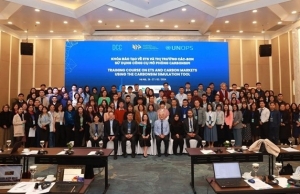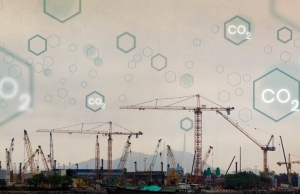Investment in Vietnam’s carbon market: the opportunities and the challenges
Vietnam’s carbon market can benefit from this growing demand, providing lucrative investment opportunities in carbon credit projects. Companies in developed countries might seek carbon credits from Vietnam to meet their compliance and voluntary offset targets.
 |
| Vu Trung Kien, director Climate Change Resilience Centre |
The proactive government policies help push up the country’s efforts, primarily for compliance with Nationally Determined Contribution (NDC) commitments. The Vietnamese government has shown a commitment to climate action through policies and initiatives that support carbon market development. Government backing can create a favourable environment for investors, including financial incentives and regulatory frameworks.
Vietnam’s national scheme on reducing emissions from deforestation and forest degradation aims to attract investments in forest conservation and sustainable management. The Law on Environmental Protection of 2020 provides the framework for the carbon market; Decree No.06/2022/ND-CP articulate articles 91 and 139 of the law; and Decision No.01/2022/QD-TTg listed the sectors and facilities subjected to article 9 of Decree 06. These and others provide good preparation and platforms for action. Some policies are constantly being reviewed and sometimes revised as a reality check.
Vietnam offers relatively low-cost options for emission reductions compared to developed countries. Investors can achieve cost-effective carbon credits by investing in energy efficiency, renewable energy, and sustainable agricultural practices. Renewable energy projects, such as solar and wind farms, can generate carbon credits at a lower cost compared to similar projects in higher-cost regions.
Abundant natural resources, including forests, wetlands, and coastal areas, are suitable for carbon offset projects. Investors can develop projects in afforestation, reforestation, and blue carbon (coastal and marine ecosystems) to generate carbon credits. Mangrove restoration projects in Vietnam can sequester significant amounts of carbon while providing additional benefits like biodiversity conservation and coastal protection.
International funding and partnerships with global organisations have focused on climate change mitigation. Investors can leverage these collaborations to access technical expertise, financial resources, and market access. Programmes like the Green Climate Fund and bilateral agreements with countries aiming to meet their NDCs can provide support for carbon projects.
Green finance mechanisms have been integrated to support sustainable development. Investors can take advantage of green bonds, climate finance initiatives, and other financial instruments to fund carbon projects. Issuing green bonds to finance renewable energy projects can attract socially responsible investors looking for sustainable investment opportunities. The taxonomy for green bonds is being worked upon by the State Bank of Vietnam, to be issued within 2024.
Boosting effectiveness
Multinational companies operating in Vietnam are under pressure to reduce their carbon footprints and adhere to sustainability commitments. Investors can partner with these corporations to develop and implement carbon offset projects that meet corporate sustainability goals. A global corporation might invest in local renewable energy projects in Vietnam to offset its carbon emissions and enhance its corporate social responsibility profile.
Advances in technology can improve the efficiency and effectiveness of carbon reduction projects. Leveraging cutting-edge technologies, such as advanced satellite monitoring for forestry projects or AI-driven energy management systems, can enhance project outcomes and carbon credit generation. Using drones for forest monitoring can provide accurate data on carbon sequestration rates, improving the verification process for forest carbon credits.
There is a growing emphasis on building local capacity and expertise in carbon market mechanisms. Investors can benefit from investing in training programmes and capacity-building initiatives that enhance local skills and knowledge, ensuring the sustainability and scalability of carbon projects. Partnering with local universities and research institutions is a way to develop specialised initiatives in carbon accounting and project management.
There remain huge challenges ahead, though. The carbon market in Vietnam is still evolving, with potential changes in policies and regulations. Regulatory uncertainty can pose risks for investors, affecting the stability and predictability of the market. Changes in national policies on carbon pricing or emissions trading could impact the feasibility and profitability of carbon projects.
Ensuring accurate measurement, reporting, and verification (MRV) of emission reductions is critical for the credibility of carbon credits. Limited local expertise and infrastructure for MRV can hinder the development and validation of carbon offset projects. Inaccurate or inconsistent MRV processes can lead to disputes over the validity of carbon credits, affecting market confidence.
The carbon market in Vietnam may be fragmented, with multiple standards and methodologies in use. Investors might face difficulties navigating different schemes and ensuring the compatibility of credits across various markets. Differences between national and international carbon credit standards can complicate trading and limit market liquidity.
Carbon offset projects can face operational, environmental, and social risks that affect their success. Managing these risks requires careful planning and ongoing management to ensure projects deliver expected emissions reductions. A reforestation project might encounter challenges such as land tenure disputes, community opposition, or natural disasters.
Economic conditions and market dynamics can impact the carbon market in Vietnam, influencing the supply and demand for credits. Investors need to be prepared for potential volatility in carbon credit prices and market conditions. Economic downturns or changes in energy prices can affect the attractiveness of carbon offset investments.
A landscape to navigate
As the carbon market grows, competition for high-quality projects and resources can increase. Investors may face higher costs and reduced availability of prime project locations and partners. Increased competition for land suitable for reforestation or renewable energy projects can drive up prices and complicate project development.
The infrastructure for trading carbon credits in Vietnam is still developing. Investors may face difficulties in accessing reliable market platforms and services for buying and selling carbon credits. The absence of a well-established national carbon exchange can limit market liquidity and increase transaction costs.
Ensuring that carbon projects adhere to robust environmental and social safeguards is crucial for their success. Projects that fail to meet these safeguards may face legal challenges and opposition from local communities and non-governmental organisations (NGOs). A hydropower project might need to address concerns about its impact on local fisheries and water resources to gain community support and regulatory approval.
Navigating the legal and contractual landscape for carbon projects can be complex. Investors must ensure that contracts are clear, enforceable, and compliant with both national and international laws. Legal disputes over land ownership or carbon credit ownership rights can delay project implementation and reduce investor confidence.
Reliable data is crucial for the accurate assessment and verification of carbon credits. Limited availability of high-quality, transparent data can hinder the monitoring and evaluation of carbon projects. Inadequate data on baseline emissions and sequestration rates can complicate the calculation of carbon credits and reduce investor confidence.
Securing financing for carbon projects can be challenging, especially for small- and medium-sized enterprises. Investors may need to explore innovative financing solutions to support the development and scaling of carbon projects. Establishing dedicated climate finance funds or leveraging public-private partnerships to mobilise capital for carbon reduction initiatives.
Effective coordination among various stakeholders, including government agencies, private sector, NGOs, and local communities, is essential for successful carbon projects. Misalignment of interests and lack of coordination can lead to project delays and conflicts. A carbon offset project that involves multiple landowners and regulatory bodies may require extensive coordination to ensure smooth implementation and compliance.
By understanding the prospects and barriers, investors can better navigate the complexities of Vietnam’s carbon market, mitigate risks, and leverage potential benefits for sustainable and profitable investment.
 | Vietnam seals major carbon credit deal, fetching $53 million Vietnam has successfully executed a landmark transaction, selling 10.3 million tonnes of CO2 emission credits to the World Bank for nearly VND1.25 trillion VND ($52.74 million), as confirmed by the Ministry of Agriculture and Rural Development to the prime minister on December 28. |
 | Training course sheds light on emission trading system, carbon market An ongoing training course on the emission trading system (ETS) and carbon market has gathered 145 participants from relevant state agencies, organisations, and enterprises, making the first capacity-building activity in Vietnam with participation from both public and private sectors. |
 | Large emitters still to get to grips with carbon market Only a few developers of emission-heavy installations have a deep understanding of the emission trading system and carbon market, a wide-ranging survey has found. |
What the stars mean:
★ Poor ★ ★ Promising ★★★ Good ★★★★ Very good ★★★★★ Exceptional
Related Contents
Latest News
More News
- 14th Party Congress empowers CPV on socialist path: Portuguese newspaper chief (January 22, 2026 | 09:42)
- Health minister highlights comprehensive, people-centred healthcare orientation (January 22, 2026 | 09:39)
- Industry-trade sector aims to turn challenges into opportunities in new era (January 22, 2026 | 09:23)
- KoCham and KN Holdings strengthen cooperation on eco-industrial parks (January 21, 2026 | 18:11)
- AMRO forecasts 7.6 per cent GDP growth for Vietnam in 2026 (January 21, 2026 | 11:44)
- Financial sector charts next steps as Party Congress convenes (January 21, 2026 | 09:58)
- Three key dynamics supporting Vietnam’s GDP growth in 2026 (January 20, 2026 | 16:34)
- Carlsberg Vietnam and Grab encourage responsible enjoyment and safer mobility (January 16, 2026 | 19:55)
- Redefining Vietnam’s growth model for the era of innovation (January 16, 2026 | 16:40)
- Nghi Son refinery processes first non-Kuwaiti crude cargo (January 16, 2026 | 16:06)

 Tag:
Tag:

















 Mobile Version
Mobile Version